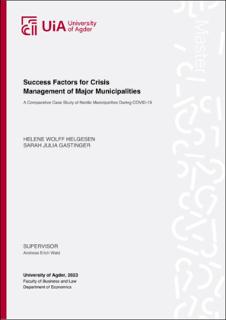| dc.description.abstract | The number of crises is increasing and being prepared for one is crucial. The aim of the study was to find critical success factors for municipalities in dealing with crises. The inspiration for writing this thesis is taken from one of the more recent global unpredictable events, COVID-19. Given its significant consequences, an interest arose in exploring ways to enhance crisis preparedness to limit potential damages. Due to the limited research on bigger organizations during times of crises, the choice became to focus on major municipalities. Coombs’ three-stage model of crisis management is used as the theoretical foundation for the study. With a qualitative case study, the thesis attempts to fill the gap in the literature about municipalities in times of crises. The thesis examines various crisis-related elements to determine what is most important at the different stages in the three phases of a crisis. This study has found critical success factors in dealing with a crisis, as well as factors that are seen as important. The success factors are being adaptable, having a crisis management plan, effective communication, as well as documenting everything clearly. The critical success factors are influenced and enhanced by several other factors looked at throughout the thesis. | |
